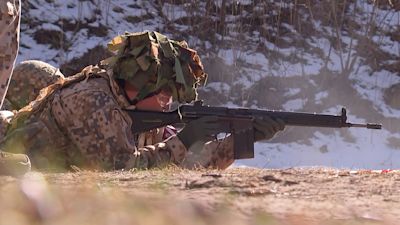Insight
'It’s better to be a warrior in the garden, than a gardener in the war': Latvians take up arms

ITV News Correspondent Rachel Younger reports on how the threat of Russian aggression has changed the outlooks of many ordinary Latvians
In a patch of woodland on the outskirts of Riga, a small group of people in military fatigues are smearing green paint across their faces.In the past hour they have handled rifles for the first time in their lives, lying on the frozen ground and learning how to train their sights on the targets in front of them.The youngest is a schoolboy of just 18, the oldest a 49-year-old manager from the nearby city. The only woman is a fresh faced pharmacy graduate, who has recently set up a successful online bakery.
They are some of the newest recruits to Latvia’s National Guard, which, much like the UK’s territorial army, has long existed to back up the professional military. But since Russia invaded Ukraine, the phone at the Guard’s recruitment centre hasn’t stopped ringing.
In just two weeks they’ve handled more enquires than in the whole of 2021.
With gunshot ringing out in the trees behind her, Agnesa, the baker turned part-time soldier, starts to explain.
“The situation in Europe, we are worried about it because it's really close to us. I like that the things I have learnt here mean I will know how to protect my family and my friends.” The Latvian government wants other citizens to follow her lead.
Right now, there is an unsettling atmosphere in this tiny country tucked between the Baltic Sea to the west and Russia to its east. The odd British stag party still staggers through the streets of Riga’s old town. But behind closed doors some families have packed emergency bags in case they need to flee. Many Latvians are still struggling to believe that after more than three decades free of Russian occupation they are threatened again. But Edgar, who is teaching Agnesa to shoot, isn’t surprised. A father of two young children, he volunteered for the National Guard in 2013 because of increasing Russian aggression.
He rattles through the dates, staccato as the gunfire: “2008, Georgia; 2014, Crimea; 2022, Ukraine. It’s been hanging over our heads for a while.”
Unlike Ukraine, Latvia is a member of NATO and knows it should be protected by Article 5.
But with a population of just 1.5 million, roughly the same as Birmingham and Bristol’s combined, it is a fraction of the size of its Russian neighbour.
Latvia’s military has fewer than 7,000 professionally trained members and 3,000 of those are reserves.
No surprise then, that many here are feeling increasingly vulnerable.
The country’s president is in the UK, alongside leaders from the rest of the Baltics, and countries like Iceland and Denmark for a summit designed to boost their defence and resilience.
But in the meantime, more and more ordinary Latvians are deciding to learn the skills they’d need to fight.
Smiling in the winter sunshine, Edgar, the company manager come shooting instructor, sums it up.
“It's better” he says, “to be the warrior in the garden, than the gardener in the war.”
Listen to analysis of the crisis on ITV News' What You Need To Know podcast